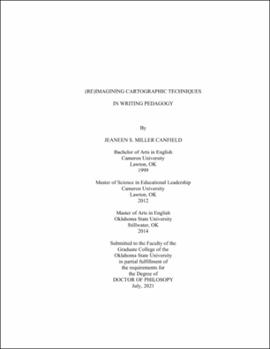| dc.contributor.advisor | Lewis, Lynn C. | |
| dc.contributor.author | Canfield, Jeaneen S. Miller | |
| dc.date.accessioned | 2022-01-21T19:20:08Z | |
| dc.date.available | 2022-01-21T19:20:08Z | |
| dc.date.issued | 2021-07 | |
| dc.identifier.uri | https://hdl.handle.net/11244/333787 | |
| dc.description.abstract | As we know and understand, reading and writing can be digital or material, and these literacy practices occur in complex layers of information intake and production. Much of writing scholarship explores and argues for an expanded and nuanced definitions of "literacy" and "embodiment." Such understandings require us to consider pedagogical strategies that foster ground-breaking ways of thinking about composition. Rather than adding to the robust scholarship deepening teachers' recognition and acknowledgement of students' 21st century composing acts, however, this project explores an innovative assignment designed to guide students to become consciously and critically aware of the influential experiences underlying their literacy practices. | |
| dc.description.abstract | One particular composing technique that offers interesting ways of presenting information in complex layers is from the field of Cartography. Maps - through color, symbols, line variations, etc. - convey multiple layers of information simultaneously. In this IRB-approved study for teacher research conducted over five semesters, I interrogated an assignment I designed and called "The Viewpoint Map." I reflexively examined data and revised my pedagogical practices impacting student literacy practices to address the following questions: 1) Considering students as writers whose out-of-class lived experiences impact their literacy practices and identities, how might the Viewpoint Map assignment guide students toward a critical awareness of their literacy practices, and 2) What could be the pedagogical value of such an assignment? To what extent, if any, does the Viewpoint Map affect students' behavior and citizenship? In short, I argue two things. First, writing instruction includes guiding students to become consciously aware of the layers of information in which they engage daily and their varied composing processes. And second, mapping techniques offer writing pedagogy fruitful implications. This project is in response to Berthoff's timeless call that writing instructors REsearch and explore pedagogical strategies to create opportunities for students to make their complex networks visible, and thus critically interrogate the layered complexities of their literacy practices. | |
| dc.format | application/pdf | |
| dc.language | en_US | |
| dc.rights | Copyright is held by the author who has granted the Oklahoma State University Library the non-exclusive right to share this material in its institutional repository. Contact Digital Library Services at lib-dls@okstate.edu or 405-744-9161 for the permission policy on the use, reproduction or distribution of this material. | |
| dc.title | (Re)imagining cartographic techniques in writing pedagogy | |
| dc.contributor.committeeMember | Cheng, An | |
| dc.contributor.committeeMember | Daniel, Joshua Luke | |
| dc.contributor.committeeMember | Sheehan, Rebecca | |
| osu.filename | Canfield_okstate_0664D_17261.pdf | |
| osu.accesstype | Open Access | |
| dc.type.genre | Dissertation | |
| dc.type.material | Text | |
| dc.subject.keywords | cartographic techniques | |
| dc.subject.keywords | composition studies | |
| dc.subject.keywords | embodiment | |
| dc.subject.keywords | literacy | |
| dc.subject.keywords | rhetoric | |
| dc.subject.keywords | writing studies | |
| thesis.degree.discipline | English | |
| thesis.degree.grantor | Oklahoma State University | |
